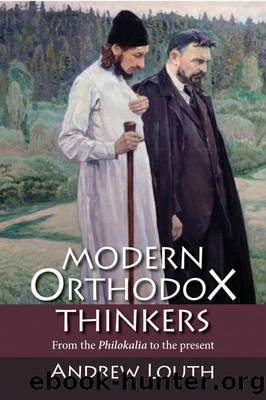Modern Orthodox Thinkers: From the Philokalia to the Present Day by Andrew Louth

Author:Andrew Louth
Language: eng
Format: mobi
Publisher: SPCK
Published: 2015-08-20T03:00:00+00:00
13
Liturgical theology: Fr Alexander Schmemann and the Greeks Ioannis Foundoulis and Fr Vasileios
Alexander Schmemann
With permission of St Vladimir’s Orthodox Seminary
The notion of liturgical theology
‘Liturgical theology’ is a relatively new concept and it is, I think, pretty well universally agreed that the very notion of ‘liturgical theology’ is closely associated with the name of Fr Alexander Schmemann: liturgical theology, that is, as opposed to liturgiology – the study of liturgical rites (usually actually liturgical texts) over the ages – or the theology of liturgy, or of worship. Liturgical theology is theology that springs from the liturgy, that is implicit in the liturgical worship of the Church, above all the celebration of the Eucharist, but stretching beyond that to encompass the daily offices of the Church, the sacramental rites, and also the structure of the liturgical day, week, year. Its watchword is: lex orandi lex credendi (properly, in Prosper of Aquitaine: legem credendi lex statuat supplicandi – the law of praying supports the law of believing). It is difficult for us (especially for anyone younger than me) to grasp how new an approach this is. In the Roman Catholic Church, liturgy was not a specific area of theology until after the reforms of the Second Vatican Council; before that liturgical studies were assigned to moral theology, canon law – and for the history of the liturgical rites themselves, church history. The case was not that much different in the Orthodox Churches: here, too, liturgical study was largely a question of the study of the liturgical rubrics. As I have already argued, I think we can see the beginnings of liturgical theology in one of Fr Alexander’s teachers, Fr Sergii Bulgakov, who made a habit of using liturgical texts and liturgical practice as a springboard for his theology. This was not, however, much noticed at the time (nor indeed since), as Bulgakov’s theological writings mostly attracted attention for their sophiological speculation.
The turn to liturgical theology was not, however, something that Fr Alexander achieved on his own; it is part of a movement in theology in the last century, a movement associated with the return to the Fathers in Western, and especially Roman Catholic, theology, that we have already noticed in connection with the neo-patristic synthesis. Just as the theologians of the neo-patristic synthesis – Florovsky, Lossky, Lot-Borodine – were friendly with and owed much to the theologians of what Catholic theologians nowadays call the movement of Ressourcement – Henri de Lubac, Jean Daniélou, Hans Urs von Balthasar, Louis Bouyer, Aloys Grillmeier, and others − so Schmemann’s liturgical theology owed a good deal to the liturgical movement in the Western Church, which culminated in the reforms of the Second Vatican Council. In his Introduction to the book published in the UK as The World as Sacrament – now known by the title of the US edition as For the Life of the World: Sacraments and Orthodoxy – Schmemann mentioned by name scholars associated with the liturgical movement – Odo Casel, Lambert Beauduin, J. A. Jungmann, Louis Bouyer, Romano Guardini, H.
Download
This site does not store any files on its server. We only index and link to content provided by other sites. Please contact the content providers to delete copyright contents if any and email us, we'll remove relevant links or contents immediately.
Under the Banner of Heaven: A Story of Violent Faith by Jon Krakauer(1789)
The Early Centuries - Byzantium 01 by John Julius Norwich(1739)
The Amish by Steven M. Nolt(1563)
Taken by J. C. Owens(1556)
In Spirit and Truth (In Spiritu Et Veritate Series) by Reed Zoe(1544)
Play It as It Lays by Joan Didion(1503)
The Apogee - Byzantium 02 by John Julius Norwich(1448)
The Last Man in Russia by Oliver Bullough(1393)
David Sedaris Diaries by David Sedaris(1289)
A History of the Amish by Steven M. Nolt(1286)
The Dance of Change by unknow(1252)
Leaving the Witness by Amber Scorah(1247)
Fallen by unknow(1209)
Tears of the Silenced: A True Crime and an American Tragedy; Severe Child Abuse and Leaving the Amish by Misty Griffin(1191)
The Angel of Forest Hill by Cindy Woodsmall(1151)
Deep Blue by unknow(1140)
The Best of Amish Cooking by Phyllis Pellman Good(1139)
The Ariana Trilogy by Rachel Ann Nunes(1122)
Escape by Carolyn Jessop & Laura Palmer(1116)
